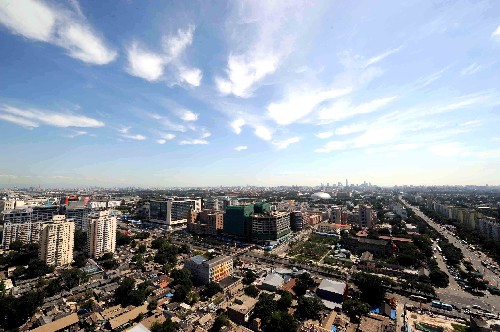For a second day, the Olympic host city reported Grade I -- or excellent -- air quality on Saturday, the eighth day of the Olympics. In most of the day, the city basked in sunshine.
Figures released by the China Environmental Monitoring Center (CEMC) revealed that Beijing's Air Pollution Index (API) showed a reading of 23 on Saturday, which fell into Grade I, whose API reading ranges between 1 and 50. On Friday, CEMC's figures showed an API reading of 17.
 |
|
A photo of Beijing, taken on August 16, 2008 [by Chen Shugen/Xinhua]
|
China uses the API system to report the country's air quality. An API reading between 51 and 100, or Grade II, means the air quality is fairly good. An API reading between 101 and 150, or Grade III, entails the air quality is slightly polluted.
Also on Saturday, deputy director of the Beijing Municipal Bureau of Environmental Protection Du Shaozhong said the city reported seven days with Grade I air quality in the first half month in August, which was the highest since 1998.
In the other eight days, Beijing's air quality was in Grade II, which was within the standards to host the Olympics.
"Beijing often reports more days with Grade I air quality during the autumn and winter in comparison with the summer. But this August, the number of days with excellent air quality is unusually high," he said.
Since 1998, the highest monthly number of days with excellent air quality in the summer was five, in July of 2006, he said. Last August only two days reported excellent air quality.
Du forecast that Beijing's air quality would be excellent or fairly good during the Olympics and Paralympics. "Should weather conditions be favorable, Beijing's air quality would be excellent. Should weather be unfavorable, the air quality would be in Grade II," he said.
Wang Zifang, a Beijing-based expert on weather forecasting, said Beijing's air quality would be excellent until Monday.
"During August 19-21, the wind is forecast to change direction and may bring pollutants from cities to the southeast of Beijing, such as Tianjin and Langfang," Wang said.
Du attributed good air quality to efforts made by Beijing to curb air pollution over the last nine years, especially this year.
Beijing municipal government said it had poured more than 140 billion yuan (US$20.5 billion) since 1998 into more than 200 projects dedicated to improving the city's air quality.
In the run-up to the Beijing Games, the host city implemented some drastic measures to reduce pollution.
In one of these measures, Beijing has imposed an odd-even restriction system based on licence plate numbers that would keep vehicles off the road on alternate days from July 20 to September 20.
(Xinhua News Agency August 17, 2008)